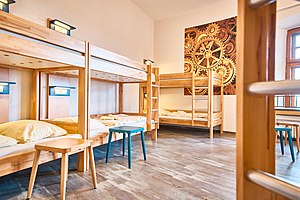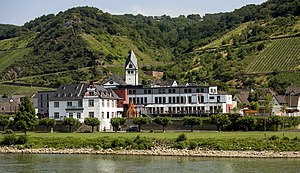youth hostel
The term youth hostel broadly describes an inexpensive, simple hostel . In a narrower sense, it refers to accommodation of the German Youth Hostel Association (DJH) in Germany , to the Austrian Youth Hostel Association or Association in Austria and to a hostel of Swiss Youth Hostels in Switzerland . Internationally, the English name Youth Hostel is common. Youth Hostel Similar facilities that are not a national association of the International Youth Hostel Association Hostelling International are connected (HI) are internationally Hostel referred.
Commercially operated accommodations that cater to backpackers contact, call themselves in Germany mostly as a hostel , backpackers hostel simple or backpackers , but may also Youth call.
Youth hostels in Germany
history


Youth hostels emerged from the beginning of the 20th century as part of the youth movement as accommodation for young people, youth groups and school classes. On August 26, 1909, Richard Schirrmann , a teacher at what is now the Richard Schirrmann School in Altena , had the vision of a youth hostel for the first time. The idea was realized by him in his school in 1911. This provisional facility was replaced in 1912 by a youth hostel at Altena Castle above the city, which can now be viewed in its original form as part of the local museums. There is also a youth hostel in the immediate vicinity. In 1911 there were already 17 youth hostels, in 1921 around 1,300 and in 1928 around 2,200. They often had large dormitories and a few smaller rooms for the carers.
With the traveling youth, the idea quickly crossed the national borders of Germany: Youth hostels emerged all over the world , which today are grouped under the umbrella of the world association Hostelling International with more than 94 national associations from 90 countries and over 4,000 youth hostels. The ideal goal has remained unchanged for almost a century, in addition to promoting youth travel, the common advocacy for peace and international understanding through the intercultural exchange of young people.
In 2019, the DJH was able to realize a total of around 9.76 million overnight stays in 450 hostels, around 60,000 more than in 2018. The developments among families are positive. With more than 2.1 million overnight stays in 2019, an increase of 6 percent compared to the previous year was achieved. The number of members in the DJH rose to 2.46 million. However, the corona pandemic has been giving the DJH a lot of trouble since spring 2020.
User groups / age limits

To use a youth hostel, membership in the German Youth Hostel Association is mandatory. In contrast to hostels, an occasional stay or a spontaneous overnight stay is only possible with simultaneous entry into the DJH.
Even today, youth hostels are still frequently used for group trips by young people, such as school trips . But there are also older guests, many parents or single parents with children, including seniors. In larger cities, business people - for example trade fair visitors - also use the services offered by the youth hostels. Reasons for this are the low overnight prices compared to the hotel, but also the closer contact with other guests and the sociable interaction among the guests. In most youth hostels there are now also smaller so-called “family rooms”; some youth hostels have completely done away with the large bedrooms. Many youth hostels are also prepared for a mixed audience.
Since 2005, older single travelers aged 27 and over have also been allowed to stay in youth hostels in Bavaria . However, young people as well as youth and school groups will continue to be given priority. The Bavarian regional association of the DJH justifies this with the earmarking of investment grants from the Bavarian state government to the regional association. In addition, "direct competition with the commercial accommodation industry [...] cannot be justified because of the direct and indirect subsidies".
In the case of international hostels, the user group and any age restriction depends on the type of hostel and the rules specified there. Some of the accommodations use a strict under-35-year-old rule, while other hostels divide the rooms according to age. There is no uniform agreement.
Furnishing

"[...] How happy the hiker is when he can build his bed well!"
Youth hostels always have communal facilities such as a dining room, bistro or cafeteria, sports facilities , lounges and the like and sometimes advertise special offers and equipment such as conference and seminar rooms, a special suitability for families or special course offers (e.g. experiential education, language courses).
Especially at the youth hostels in rural areas there is a large area with a playground, sports facilities (soccer field, basketball court, table tennis, volleyball field etc.) and mostly also a barbecue and campfire area directly at the house, through contacts with local clubs there are usually opportunities to to use municipal sports facilities.
A special focus of investments in the buildings has been placed in the last few decades both in the creation of rooms with a smaller number of beds and in the area of sanitary facilities. That is why there are now very well-equipped two and four-bed rooms with shower and toilet in many youth hostels.
A youth hostel is not a hotel . The guests make their own beds and remove them before they leave. You usually have to bring your own towels or they can be rented for a small fee. In some houses there is a closing time of a few hours a day, which is mainly used for the necessary cleaning work in the sanitary rooms.
Quality improvement
The quality of youth hostels has been improving for many years and in many places . Many youth hostels, especially in large cities, have been completely renovated or newly built and are now extremely comfortable. In 2016, a total of seven youth hostels were completely modernized or newly opened.
As the level rose, the accommodation costs were also adjusted. In 2016, the average price for an overnight stay with breakfast and bed linen was 21.50 euros. Reduced rates apply to children. A warm meal costs between 4 and 5 euros, a packed lunch less.
Educational offer
An essential difference between youth hostels and commercial facilities, such as hotels , guest houses or campsites , lies in the educational orientation of youth hostels as a partner of youth work and schools . In addition to the maintenance of communal facilities and accommodation, the youth hostels support teachers and youth group leaders with the help of programs to practice social learning in the school class or group. There is also a so-called leader's room , where the group leaders and teachers can meet to exchange ideas and concepts.
At some locations, to profile the youth hostel, professional focuses of adventure or leisure educational youth work are set, with educational profiles such as environmental youth hostels, cultural youth hostels or active and fit youth hostels. Youth hostels thus become play and development spaces for children, teenagers and young adults.
The youth hostels' socio-educational work is supported on site through cooperation with local youth welfare organizations, independent and association youth work and schools, as well as by volunteers.
organization
In Germany, 442 youth hostels are organized in the Deutsches Jugendherbergswerk (DJH), a non-profit, registered association and work according to uniform quality standards. This "main association" is not itself the owner of youth hostels, but ensures the ideal unity, carries out certification procedures (e.g. for university places), organizes international exchange with other youth hostel associations, trains the youth hostel employees in management functions and takes on central administrative tasks for them as well non-profit state associations.
The operators and mostly also owners of the individual youth hostels are the 14 regional associations of the DJH, plus a number of independent organizations, often municipalities, cities or youth associations, which make their houses available as youth hostels according to the conditions of the DJH.
After the fire brigade, the technical aid organization, the German Red Cross, the White Ring and the Johannitern, the DJH ranks 6th out of a total of 137 organizations in the GemeinwohlAtlas 2019 study. In the first study from 2015, the DJH ranked 8th.
Special postage stamp / commemorative coin
The Federal Republic of Germany honored the anniversary of the DJH with a 55-cent stamp '100 years of youth hostels' and a 10-euro silver commemorative coin ( mint Karlsruhe, weight 18 grams). It was first issued on August 13, 2009.
The "Youth Hostel" brand
The protection of the term “youth hostel” as a word mark of the German Youth Hostel Association (DJH) was controversial for years. The DJH had the trademark registered in 1998.
In April 2005, for example, the Munich Higher Regional Court gave the DJH an injunction against a Munich hostelier right. This had advertised on the Internet with the word "youth hostel". The judges were of the opinion that this behavior was immoral, misleading and intercepted customers under trademark law (AZ. 29 U 5753/04).
After five years of litigation between the plaintiff A&O Hotels and Hostels and the DJH, the Federal Patent Court (Az .: 25 W (pat) 8/06) ordered in January 2009 to delete the “Youth Hostel” brand. The DJH filed a complaint against this with the Federal Court of Justice, so that the name initially remained protected and the legal dispute entered a new round. With a decision by the BGH on September 17, 2009, the DJH's appeal was rejected. The youth hostel brand has thus been permanently deleted.
The DJH claimed to have introduced the term into the German language and to only want to use the term for its own accommodations that meet high quality requirements. The plaintiff was of the opinion that the term had become a generally descriptive part of the German language. In particular, the search in the dictionary for the English term “youth hostel” always results in the translation “youth hostel”, so that private providers are disadvantaged.
Youth hostels
Youth Hostel is the English-speaking term for youth hostel . Therefore, in English-speaking countries such as New Zealand, Australia, Great Britain or South Africa, the word denotes hostels of the respective youth hostel association. The 21 youth hostels in the Republic of Ireland operate under the Gaelic name An Óige ("youth").
Position of youth hostels in relation to other accommodations
Youth hostels are recognized as non-profit and do not have to pay corporate income tax or trade tax. They are also exempt from tax in the Value Added Tax Act, as they perform public tasks as independent youth welfare organizations.
Since the houses of the German Youth Hostel Association differ only slightly from those of similar, private companies and the prices are sometimes even higher than those of privately run accommodation providers, there is often criticism of their preferred position. This is especially true since many new youth accommodation ( hostels ) were established in Germany around the turn of the millennium .
At the same time, the youth hostels of the German Youth Hostel Association are increasingly market-oriented. Many youth hostels can be booked on commercial platforms and similar products are offered through other sales channels. With this justification, commercial competition is increasingly attacking the (tax) privileges of the DJH, including through a complaint to the EU Commission due to inadmissible subsidies.
Related topics
- Host services are cost-effective alternatives to youth hostels
- Hostels are inexpensive, very basic accommodations
- Youth castles are alternative accommodations for scouts and other youth movements.
- Children and youth recreation centers (KiEZ) are inexpensive accommodations especially for groups of children and young people
See also
literature
- Eva Kraus: The German Youth Hostel Association 1909–1933. Program - people - synchronization. Berlin 2013, ISBN 978-3-86386-488-0 .
- Jürgen Reulecke , Barbara Stambolis (Ed.): 100 Years of Youth Hostels 1909–2009. Beginnings - changes - retrospectives and outlooks. Klartext Verlag , Essen 2009, ISBN 978-3-89861-990-5 .
- Reyk Seela : The Youth Hostel Myth: The Youth Hostel Association in Thuringia - a historical outline. Festschrift for the 20th anniversary of the re-establishment of the DJH Regional Association of Thuringia. Bussert & Stadeler, Jena / Plauen / Quedlinburg 2011, ISBN 978-3-942115-12-4 .
- Eberhard Harms: Youth hostels from 1945 to 1955, 10 years of change, continuity and reconstruction , Sutton. Erfurt 2005, ISBN 978-3-89702-744-2 .
- Beatrice Härig: Selfie with knight armor. Youth hostels in the 21st century. in: Monumente Magazin June 2018, pp. 66–73
Web links
- Literature on the subject of youth hostels in the catalog of the German National Library
- Eva Kraus: Youth Hostels In: Historical Lexicon of Bavaria (June 24, 2013)
- BGH decision on the youth hostel brand
- Youth hostels of the DJH in Germany
- Youth hostels in Austria - Austrian Youth Hostel Association
- Swiss youth hostels
- International Youth Hostel Association
Individual evidence
- ↑ focus.de: The charm of bunk beds
- ↑ Kölner Stadt-Anzeiger of March 9, 1921
- ↑ http://www.dw-world.de/dw/article/0,,3967713,00.html
- ↑ https://www.jugendherberge.de/jugendherbergen/altena-burg-343/portraet/
- ^ DJH annual report
- ↑ Kay-Alexander Scholz: Corona: Youth Hostels in Need dw.com , August 19, 2020
- ↑ Quality standards in the DJH
- ↑ Profile: Environmental Youth Hostels
- ↑ Profile: Cultural Youth Hostels
- ↑ Public Value Atlas 2019
- ^ Meta tags - youth hostel
- ↑ Youth hostel for everyone ( page no longer available , search in web archives ) Info: The link was automatically marked as defective. Please check the link according to the instructions and then remove this notice. , Süddeutsche Zeitung, January 29, 2009.
- ↑ Federal Supreme Court to clarify the dispute over the “Youth Hostel” brand , beck-aktuell-Redaktion (Verlag CH Beck) 10 February 2009
- ↑ Deletion procedure youth hostel ( page no longer available , search in web archives ) Info: The link was automatically marked as defective. Please check the link according to the instructions and then remove this notice. ( MS Word ; 128 kB), Lawyer Stelzner, August 10, 2009.
- ↑ The “Youth Hostel” brand on www.jugendherberge.de ( Memento of the original from February 21, 2009 in the Internet Archive ) Info: The archive link was inserted automatically and has not yet been checked. Please check the original and archive link according to the instructions and then remove this notice.
- ↑ www.welt.de: Berlin for the subsidization of youth hostels , accessed October 22, 2014
- ↑ See Ulrich Linse: Review of: Reulecke, Jürgen; Stambolis, Barbara (Ed.): 100 Years of Youth Hostels 1909–2009. Beginnings - changes - retrospectives and outlooks. Essen 2009. In: H-Soz-u-Kult , December 22, 2009.










